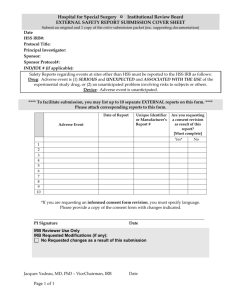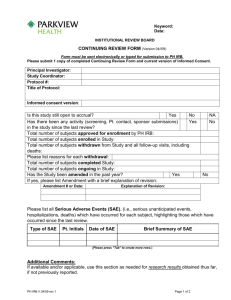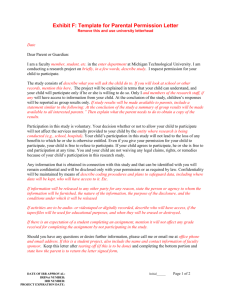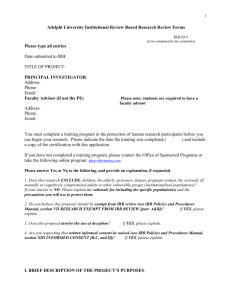tissues humans
advertisement
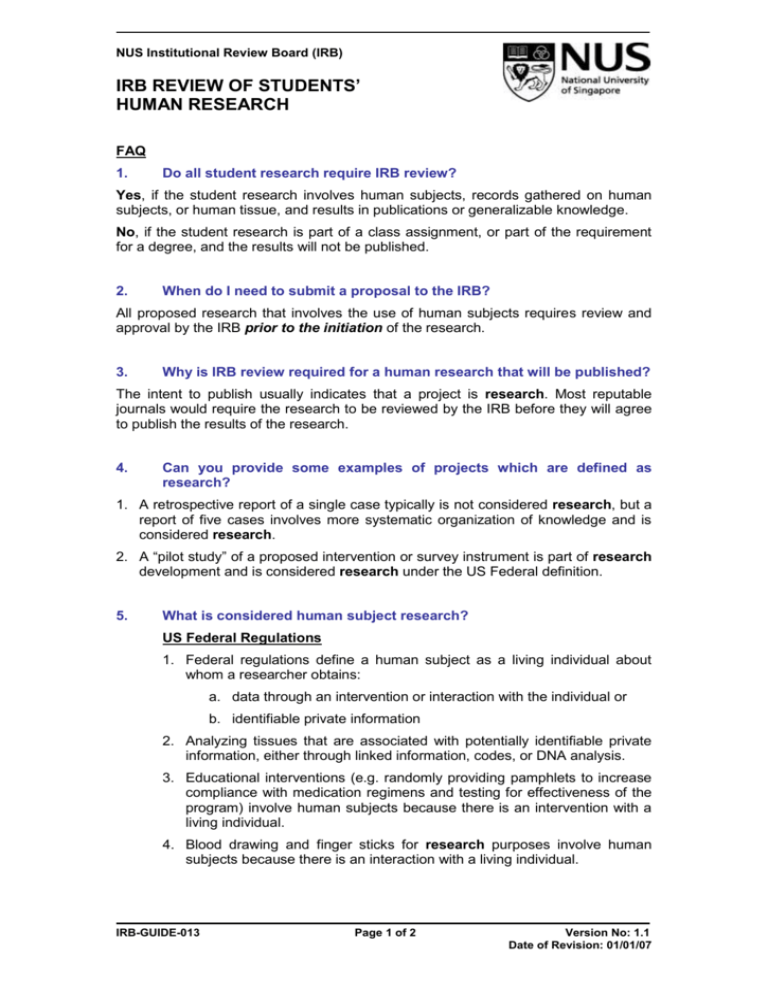
NUS Institutional Review Board (IRB) IRB REVIEW OF STUDENTS’ HUMAN RESEARCH FAQ 1. Do all student research require IRB review? Yes, if the student research involves human subjects, records gathered on human subjects, or human tissue, and results in publications or generalizable knowledge. No, if the student research is part of a class assignment, or part of the requirement for a degree, and the results will not be published. 2. When do I need to submit a proposal to the IRB? All proposed research that involves the use of human subjects requires review and approval by the IRB prior to the initiation of the research. 3. Why is IRB review required for a human research that will be published? The intent to publish usually indicates that a project is research. Most reputable journals would require the research to be reviewed by the IRB before they will agree to publish the results of the research. 4. Can you provide some examples of projects which are defined as research? 1. A retrospective report of a single case typically is not considered research, but a report of five cases involves more systematic organization of knowledge and is considered research. 2. A “pilot study” of a proposed intervention or survey instrument is part of research development and is considered research under the US Federal definition. 5. What is considered human subject research? US Federal Regulations 1. Federal regulations define a human subject as a living individual about whom a researcher obtains: a. data through an intervention or interaction with the individual or b. identifiable private information 2. Analyzing tissues that are associated with potentially identifiable private information, either through linked information, codes, or DNA analysis. 3. Educational interventions (e.g. randomly providing pamphlets to increase compliance with medication regimens and testing for effectiveness of the program) involve human subjects because there is an intervention with a living individual. 4. Blood drawing and finger sticks for research purposes involve human subjects because there is an interaction with a living individual. IRB-GUIDE-013 Page 1 of 2 Version No: 1.1 Date of Revision: 01/01/07 NUS Institutional Review Board (IRB) Singapore BAC Guidelines BAC Guidelines made a distinction between Direct Human Biomedical Research (DHBR), which involves direct interference or interaction with the physical body of a human subject, and Indirect Human Biomedical Research (IHBR), which does not involve such direct interference or interaction (for example, research involving human subjects in population studies or collecting medical, personal or genetic information, human tissues or cells) 6. My research was a class project but the results, if published, would benefit the public. Can I submit a request for a retrospective review? NUS-IRB does not encourage retrospective review. If you have an intention to publish your research, you should submit your IRB application before the research begins. In the event that your supervisor decided that the results of a completed class project should be published, he/she can submit the application for IRB review. In his/ her application for retrospective review, he/she should provide justifications. NUS-IRB will review this research as if the research has yet to be conducted. If there are strong ethical considerations, the board can disapprove the research from being published. 7. What is considered “minimal risk”? The Office for Human Research Protections (OHRP) defines “minimal risk” as: "The probability and magnitude of harm or discomfort anticipated in the research are not greater in and of themselves than those ordinarily encountered in daily life or during the performance of routine physical or psychological examinations or tests." 8. What is a Consent Form? The consent form contains the basic elements of informed consent as identified in and required by the SG GCP regulations regarding the protection of human subjects. As required by this regulation, the informed consent for nonexempt research must be reviewed and approved by an Institutional Review Board. The consent form guidance documents are included on the NUS-IRB web-site. 9. How long would the review process take? (a) “Exempt” research is reviewed within approximately one week upon receipt. (b) Some non-exempt research that does not present greater than minimal risk can be reviewed by expedited review within about four weeks. Research that presents greater than minimal risk requires Full Board reviews. (c) A full board review involves the full board which meets monthly. Revisions suggested by the full board, unless they are very specific, must be brought back to a full board meeting for final approval. This may take 6-8 weeks. IRB-GUIDE-013 Page 2 of 2 Version No: 1 Date of Revision: 25/08/05



